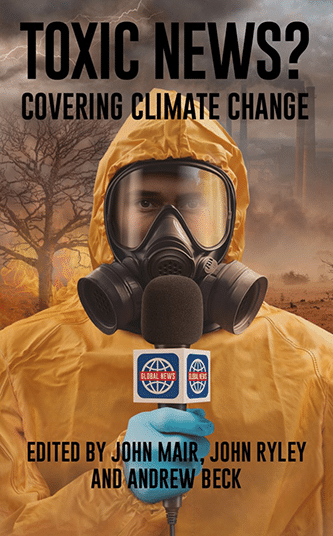Climate change and how to combat it will be one of the big wedge issues at the next UK General Election. There are plenty of good intentions and much enshrined in law following the various UN COP summits. How many of them will be jettisoned on the way to electoral victory. How will the British media report it?
This timely book brings together twenty-five journalists, commentators, and academics to discuss the way the UK media has covered climate change written in a snappy, approachable way.
Read the press release:
Climate change should be treated just like any other story – Tom Heap
‘Climate change is – or should be – the most gripping story around. The stakes could not be higher, there are some heroes and we are all players. So why are the two Cs – climate change – often an audience turn off, whether in print or broadcast?’ That’s one of the questions broadcaster Tom Heap asks in this timely new book’s preface, neatly summarising the media’s dilemma.
But climate change programmes don’t attract large audiences. As Sky’s former editor-in-chief and one of the book’s editors John Ryley laments ‘Essentially any coverage of the climate story needs to be done in a documentary format to really see any significant cut through with viewers’.
Toxic News? Covering Climate Change is published against the backdrop of Rishi Sunak’s screeching U-turn on net zero targets, COP 28 starting on 30 November, and the emergence of fully-fledged eco-scepticism. Climate change and how to combat it will be one of the critical issues at the next UK General Election. How many good intentions or laws will be jettisoned on the way to electoral victory? Will the sceptics be gagged? How will the British media report it?
Sir John Curtice, a contributor to the book adds that… ‘it looks as though many voters, of all political persuasions, are hoping that climate change will be addressed by government action, and that in the meantime they will largely be able to carry on with their lives as usual’.
Another contributor, former Times executive Liz Gerard is pessimistic: ‘Our newspapers look out of touch, out of date and out of ideas’. She concludes, ‘Tackling climate change is the number one issue for younger generations. But it’s the older generations who vote and buy newspapers’.
The book brings together twenty-five journalists, commentators, and academics to discuss the way the UK media has covered climate change so far in a snappy, approachable way. Contributors are: Robin Aitken, Matthew d’Ancona, Andrew Beck, Malcolm Bradbrook, Zoe Broughton, Maggie Brown, Philip Collins, Paul Connew, Prof Sir John Curtice, Prof Stephen Cushion, Jon Fuller, Dr Alan Geere, Liz Gerard, Prof Philip Hammond, John Mair, Isabelle Marchand, Dr Steven McCabe, Prof Chris Paterson, Prof Julian Petley, John Ryley, Raymond Snoddy, Belinda Tyrrell, Dr Elke Weissmann, Christian Wolmar, Peter York, and Ted Young.
Toxic News? Covering Climate Change is published by Bite-Sized Books, and is available now from Amazon in paperback See: https://tinyurl.com/5a5fbvxy.
For media interviews contact:
John Mair on 07785 378156 / johnmair100@hotmail.com
John Ryley – jhxryley@gmail.com
About the editors
John Ryley was the Editor-in-Chief of Sky News from 2006 to 2023. He was a BBC graduate trainee, then a programme editor of ITV’s News at Ten, before joining Sky News. In 2021, The Royal Television Society gave him the Outstanding Contribution award for journalism. The judges said ‘he has effected genuine change in our business […] his style is innovative, idiosyncratic. His integrity, influence, and authority, colossal’. He is a trustee of the NCTJ, and will become Chair of the Geddes Trust in March 2024.
John Mair was born in the then-British Guiana. In Guyana he writes there under the nom de guerre Bill Cotton/Reform. John has taught journalism at the universities of Coventry, Kent, Northampton, Brunel, Edinburgh Napier, and Guyana and at the Communication University of China. He has edited more than fifty hackademic volumes over the last twelve years. In a previous life, he was an award-winning producer/director for the BBC, ITV, and Channel 4, and a secondary school teacher.
Andrew Beck worked in UK secondary, further, and higher education for forty-two years. He is author of frequently cited works such as Cultural Work and Communication Studies: The Essential Introduction, as well as having served as chief examiner for public and professional examinations. Recent publications include contributions to, and co-editing books on Covid-19, the Ukraine war, Boris Johnson’s premiership, the British monarchy, as well as occasional features for China Eye.

